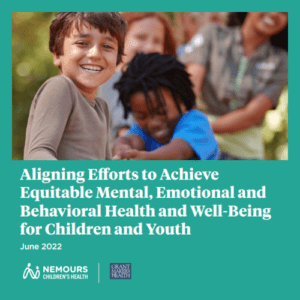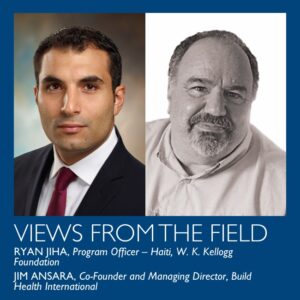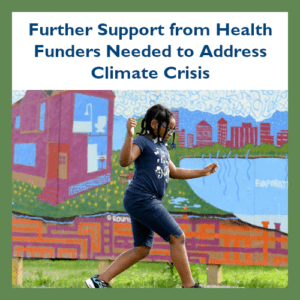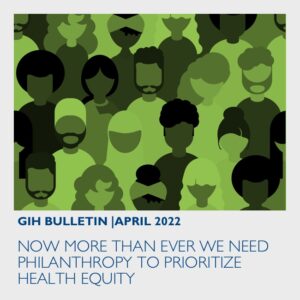Upcoming Events
Past Events
Latest Resources
It’s Time to Converge on Narrative Change for Racial Justice and Health Equity
Philanthropy is increasingly embracing narrative change as a tool for building public and political will to advance equitable policies and structural change. Yet philanthropic narrative investments to advance racial justice and health equity are still relatively new and disparate. The work is often siloed, lessons and insights are not often shared across efforts, and there is also a wide range of definitions of narratives, perspectives, and approaches on how to shift them.
Aligning Efforts to Achieve Equitable Mental, Emotional, and Behavioral Health and Well-Being for Children and Youth
This report issues a call to action for philanthropic organizations and public-sector partners that are ready to move forward in improving mental, emotional, and behavioral health. It describes existing philanthropic and federal initiatives and offers a potential portfolio of aligned strategies for private- and public-sector partners to consider.
Investing in Asian American, Native Hawaiian, and Pacific Islander Communities through Strategic Philanthropic Partnerships
May is Asian American Pacific Islander heritage month, celebrating the fastest-growing racial group in the United States. Recent priorities for grantmakers have focused on racial equity, health and well-being, and immigrant rights. Yet, investments for Asian American, Native Hawaiian, and Pacific Islanders have been under-resourced and deprioritized, receiving only 0.26 percent of philanthropic dollars and 0.17 percent of research funding from the National Institutes of Health.
Beyond the Headlines: Towards a New Narrative for Health Philanthropy in Haiti
Contrary to the narrative that all philanthropic investments have been ineffective in Haiti, Partners In Health, Build Health International, and Health Equity International have had immense positive impacts on the health sector in Haiti over the last decade. With sustained funding from the W.K. Kellogg Foundation, these nongovernmental organizations are committed to tackling systemic inequities embedded in the health care system.
Multiplying Funder Impact Through Multisector Collaborations: Models for Creating Racial and Health Equity
Multisector collaborations epitomize the expression “the whole is greater than the sum of its parts.” Working together toward common goals, organizations from different sectors that listen and work directly with communities can multiply their impact compared to what they can accomplish working separately. Because of this, funders too can expand their impact by investing in and encouraging these multisector collaborations that serve as engines for lifting up community voices and promoting equity.
Reducing Pollution: Critical Pathway for Cancer Prevention
Health professionals and health advocacy groups are learning how they can elevate environmental chemicals as an important element of cancer prevention, including in research design, clinical practice, policy advocacy, and in cancer initiatives such as the Beau Biden Moonshot and states’ 5-year cancer prevention and control plans. When health leaders are given the opportunity to examine barriers to cancer prevention, including those they may contribute to, they gain confidence in their ability—and responsibility—to use their power as trusted messengers to call for dramatic reductions in carcinogens.
Further Support from Health Funders Needed to Address Climate Crisis
The Kresge Foundation’s Health Program Senior Fellow Chris Kabel discusses the need for health funder engagement to address the climate crisis.
Now More than Ever We Need Philanthropy to Prioritize Health Equity
April marks National Minority Health Month. It is a time for us to educate ourselves on the health challenges facing communities of color and other vulnerable populations, and to reflect on the progress we have made towards advancing health equity and what more we must do…
How Local Health Departments Can Commit to Transformative Change through Racial Healing
In this new era of public health care and practice, as our global community continues to endure the impact of a pandemic, we have a unique opportunity and responsibility to ensure we do not fall back into old patterns. This is our chance as a larger health-focused collective to use our expertise, influence, and resources to change the landscape of health. Governmental agencies, nonprofits, clinical and non-clinical groups, and funders have an important role in the future of public health.
Connect With Funder Peers on Health Equity
Interested in exchanging strategies, information, and questions with your funder peers? Sign up for GIH E-Forums.
Strengthen your knowledge, skills, and capacity.
GIH focuses our programming around five areas that are critical to achieving better health for all.
We invite you to explore the resources available on our focus areas pages, browse content in more specific issue areas, and to connect with GIH staff to discuss how we can partner and support your work.









